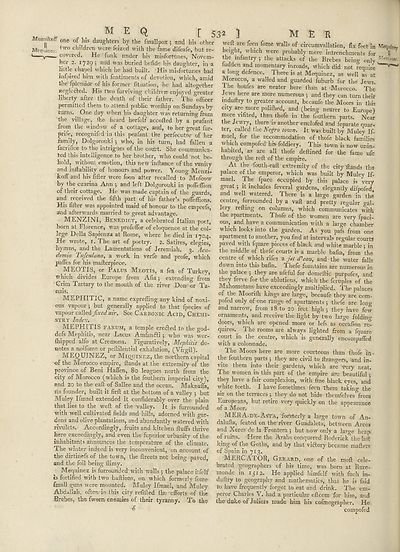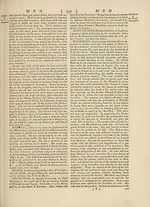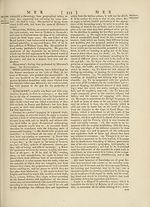Encyclopaedia Britannica, or, a Dictionary of arts, sciences, and miscellaneous literature : enlarged and improved. Illustrated with nearly six hundred engravings > Volume 13, MAT-MIC
(578) Page 532
Download files
Complete book:
Individual page:
Thumbnail gallery: Grid view | List view

M £ Q [ 5
Manzikofr one of his daughters by the fm all pox ; and his other
Mequine/. two c^^^reT1 Were ^ized with the fame difeafe, but re-
v—• ■ v—— covered. He funk under his misfortunes, Novem¬
ber 2. 1729 •, and was buried befide his daughter, in a
little chapel which lie had built. His misfortunes had
infpired him with fentiments of devotion, which, amid
the fplendtfr of his former fituation, he had altogether
tfegktfed. His fWo furviving children enjoyed greater
liberty after the death of their father. The officer
permitted them to attend public worffiip on Sundays by
turns. One day when his daughter was returning from
the village, ffie heard herfelf accofted by a peafant
from the window of a cottage, and, to her great fur*
prife, recognifed in this peafant the perfecutOr of her
family, Dolgorouki ; who, in his turn, had fallen a
facrifce to the intrigues of the court. She communica¬
ted this intelligence to her brother, who could not be¬
hold, without emotion, this new inftance of the vanity
and inftability of honours and power. Young Menzi"-
koff and his fifter were foon after recalled to Mofcow
by the czarina Ann 5 and left Dolgorouki in poffeflion
of their cottage. He was made captain of the guards,
and received the fifth part of his father’s poffeffions.
His fifter was appointed maid of honour to the emprefs,
3nd afterwards married to great advantage.
MENZIN1, Benedict, a celebrated Italian poet,
born at Florence, Was profeffor of eloquence at the col¬
lege Della Sapienza at Rome, where he died in 1704.
He wrote, x. The art of poetry. 2. Satires, elegies,
hymns, and the Lamentations of Jeremiah. 3. Aca¬
demia Tifculana, a work in verfe and profe, which
paffes for his mafterpiece.
M EOT IS, or Palus Meotis, a fea of Turkey,
which^ divides Europe from Afia 5 extending from
Grim Tartary to the mouth of the river Don or Ta-
nais.
MEPHITIC, a name expreffing any kind of noxi¬
ous vapour; but generally applied to that fpecies of
vapour called fixed air. See Carbonic Acid, Chemi¬
stry Index.
MEPHITIS FANUM, a temple creeled to the god-
defs Mephitis, near Lacus Amfanfti ; who was wor-
ftiipped alfo at Cremona. Figuratively, Mephitis de¬
notes a noifome or peftilential exhalation, (Virgil).
MEQUINEZ, or Miquinez, the northern capital
of the Morocco empire, ftands at the extremity of the
province of Beni Haffen, 80 leagues north from the
city of Morocco (which is the fouthern imperial city),
and 20 to the eaft of Sallee and the ocean. Maknaffa,
its founder, built it firft at the bottom of a valley ; but
Muley Ifmael extended it confiderably over the plain
that lies to the weft of the valley. It is furrounded
with well cultivated fields and hills, adorned with gar¬
dens and olive plantations, and abundantly watered with
rivulets. Accordingly, fruits and kitchen fluffs thrive
here exceedingly, and even the fuperior urbanity of the
inhabitants announces the temperature of the climate.
The winter indeed is very inconvenient, on account of
the dirtinefs of the town, the ftreets not being paved,
and the foil being flimy.
Mequinez is furrounded with walls ; the palace itfelf
is fortified with two baftions, on which formerly feme
fmall guns were mounted. Muley Ifmael, and Muley
Abdallah, often in this city refilled the efforts of the
Brebes, the fwom enemies of their tyranny. To the
1 ME R
weft are feen feme walls of circumvallation, fix feet in Wciiuti,-
hesght, which were probably mere intrenchments for II '
the infantry ; the attacks of the Brebes beinc only />?erCilt0r-
fudden and momentary inroads, which did not require ' ^
a long defence. There is at Mequinez, as well as at
Morocco, a walled and guafded fuburb for the Jews.
I he houfes are neater here than at Morocco. The
Jews here are more numerous ; and they can turn their
induftry to greater account, becaufe the Moors in this
city are more poliffied, and (being nearer to Europe)
more vifited, than thofe in the fouthern parts. Near
the Jewry, there is another enclofed and feparate quar¬
ter, called the Negro town. It Was built by Muley If.
mael, for the accommodation of thofe black families
which compofed his foldiery. 1 his town is now unin¬
habited, as are all thofe deftined for the fame ufe
through the reft: of the empire.
At the fouth-eaft extremity of the city'ftands the
palace of the emperor, which was built by Muley If-
mael. The fpace dcciipied by this palace is very
great; it includes feveral gardens, elegantly difpofed,
and well watered. There is a large garden in the
centre, furrounded by a vaft and pretty regular gal¬
lery refting on columns, which communicates with
the apartments. I hofe of the women are very fpaci-
ous? and have a communication with a large chamber
which looks into the garden. As you pals from one
apartment to another, you find at intervals regular courts
paved with fquare pieces of black and white marble ; in
the middle of thefe courts is a marble bafin, from the
centre of which rifes a jet d'eau, and the water falls
down into this bafin. 1 hefe fountains are numerous in
the palace ; they are ufeful for domeftic purpofes, and
they ferve for the ablutions, which the fcruples of the
Mahometans have exceedingly multiplied. The palaces
of the Mooriffi kings are large, becaufe they are com¬
pofed only of one range of apartments ; thefe are long
and narrow, from 18 to 20 feet high ; they have few
ornaments, and receive the light by two large folding
doors, which are opened more or lefs as occafion re^
quires.. The rooms are always lighted from a fquare
court in the centre, which is generally encompafled
with a colonnade.
The Moors here are more courteous than thofe irt-
the fouthern parts ; they are civil to ftrangers, and in¬
vite them into their gardens, which are Very neat.
The women in this part of the empire are beautiful ;
they have a fair complexion, with fine black eyes, and
white teeth. I have fometimes feen Them taking the
air on the terraces ; they do not hide themfelves from
Europeans, but retire very quickly on the appearance
of a Moor.
MERA-DE-AsTa , formerly a large town of An-
dalufta, feated on the river Guadaleta, between Arcos
and Xeres de la Frontera ; but now only a large heap
of ruins. Here the Arabs conquered Roderick the lalt
king of the Goths, and by that vidtory became mafters
of Spain in 713.
MERCATOR, Gerard, one of the moft cele¬
brated geographers of his time, was born at Rurc-
monde in 1512. He applied himfclf with fuch in¬
duftry to geography and mathematics, that he is faid
to have frequently forgot to eat and drink. The em¬
peror Charles V. had a particular efteem for him, and
the duke of Juliets made him his cofmographer. He
compofed
Manzikofr one of his daughters by the fm all pox ; and his other
Mequine/. two c^^^reT1 Were ^ized with the fame difeafe, but re-
v—• ■ v—— covered. He funk under his misfortunes, Novem¬
ber 2. 1729 •, and was buried befide his daughter, in a
little chapel which lie had built. His misfortunes had
infpired him with fentiments of devotion, which, amid
the fplendtfr of his former fituation, he had altogether
tfegktfed. His fWo furviving children enjoyed greater
liberty after the death of their father. The officer
permitted them to attend public worffiip on Sundays by
turns. One day when his daughter was returning from
the village, ffie heard herfelf accofted by a peafant
from the window of a cottage, and, to her great fur*
prife, recognifed in this peafant the perfecutOr of her
family, Dolgorouki ; who, in his turn, had fallen a
facrifce to the intrigues of the court. She communica¬
ted this intelligence to her brother, who could not be¬
hold, without emotion, this new inftance of the vanity
and inftability of honours and power. Young Menzi"-
koff and his fifter were foon after recalled to Mofcow
by the czarina Ann 5 and left Dolgorouki in poffeflion
of their cottage. He was made captain of the guards,
and received the fifth part of his father’s poffeffions.
His fifter was appointed maid of honour to the emprefs,
3nd afterwards married to great advantage.
MENZIN1, Benedict, a celebrated Italian poet,
born at Florence, Was profeffor of eloquence at the col¬
lege Della Sapienza at Rome, where he died in 1704.
He wrote, x. The art of poetry. 2. Satires, elegies,
hymns, and the Lamentations of Jeremiah. 3. Aca¬
demia Tifculana, a work in verfe and profe, which
paffes for his mafterpiece.
M EOT IS, or Palus Meotis, a fea of Turkey,
which^ divides Europe from Afia 5 extending from
Grim Tartary to the mouth of the river Don or Ta-
nais.
MEPHITIC, a name expreffing any kind of noxi¬
ous vapour; but generally applied to that fpecies of
vapour called fixed air. See Carbonic Acid, Chemi¬
stry Index.
MEPHITIS FANUM, a temple creeled to the god-
defs Mephitis, near Lacus Amfanfti ; who was wor-
ftiipped alfo at Cremona. Figuratively, Mephitis de¬
notes a noifome or peftilential exhalation, (Virgil).
MEQUINEZ, or Miquinez, the northern capital
of the Morocco empire, ftands at the extremity of the
province of Beni Haffen, 80 leagues north from the
city of Morocco (which is the fouthern imperial city),
and 20 to the eaft of Sallee and the ocean. Maknaffa,
its founder, built it firft at the bottom of a valley ; but
Muley Ifmael extended it confiderably over the plain
that lies to the weft of the valley. It is furrounded
with well cultivated fields and hills, adorned with gar¬
dens and olive plantations, and abundantly watered with
rivulets. Accordingly, fruits and kitchen fluffs thrive
here exceedingly, and even the fuperior urbanity of the
inhabitants announces the temperature of the climate.
The winter indeed is very inconvenient, on account of
the dirtinefs of the town, the ftreets not being paved,
and the foil being flimy.
Mequinez is furrounded with walls ; the palace itfelf
is fortified with two baftions, on which formerly feme
fmall guns were mounted. Muley Ifmael, and Muley
Abdallah, often in this city refilled the efforts of the
Brebes, the fwom enemies of their tyranny. To the
1 ME R
weft are feen feme walls of circumvallation, fix feet in Wciiuti,-
hesght, which were probably mere intrenchments for II '
the infantry ; the attacks of the Brebes beinc only />?erCilt0r-
fudden and momentary inroads, which did not require ' ^
a long defence. There is at Mequinez, as well as at
Morocco, a walled and guafded fuburb for the Jews.
I he houfes are neater here than at Morocco. The
Jews here are more numerous ; and they can turn their
induftry to greater account, becaufe the Moors in this
city are more poliffied, and (being nearer to Europe)
more vifited, than thofe in the fouthern parts. Near
the Jewry, there is another enclofed and feparate quar¬
ter, called the Negro town. It Was built by Muley If.
mael, for the accommodation of thofe black families
which compofed his foldiery. 1 his town is now unin¬
habited, as are all thofe deftined for the fame ufe
through the reft: of the empire.
At the fouth-eaft extremity of the city'ftands the
palace of the emperor, which was built by Muley If-
mael. The fpace dcciipied by this palace is very
great; it includes feveral gardens, elegantly difpofed,
and well watered. There is a large garden in the
centre, furrounded by a vaft and pretty regular gal¬
lery refting on columns, which communicates with
the apartments. I hofe of the women are very fpaci-
ous? and have a communication with a large chamber
which looks into the garden. As you pals from one
apartment to another, you find at intervals regular courts
paved with fquare pieces of black and white marble ; in
the middle of thefe courts is a marble bafin, from the
centre of which rifes a jet d'eau, and the water falls
down into this bafin. 1 hefe fountains are numerous in
the palace ; they are ufeful for domeftic purpofes, and
they ferve for the ablutions, which the fcruples of the
Mahometans have exceedingly multiplied. The palaces
of the Mooriffi kings are large, becaufe they are com¬
pofed only of one range of apartments ; thefe are long
and narrow, from 18 to 20 feet high ; they have few
ornaments, and receive the light by two large folding
doors, which are opened more or lefs as occafion re^
quires.. The rooms are always lighted from a fquare
court in the centre, which is generally encompafled
with a colonnade.
The Moors here are more courteous than thofe irt-
the fouthern parts ; they are civil to ftrangers, and in¬
vite them into their gardens, which are Very neat.
The women in this part of the empire are beautiful ;
they have a fair complexion, with fine black eyes, and
white teeth. I have fometimes feen Them taking the
air on the terraces ; they do not hide themfelves from
Europeans, but retire very quickly on the appearance
of a Moor.
MERA-DE-AsTa , formerly a large town of An-
dalufta, feated on the river Guadaleta, between Arcos
and Xeres de la Frontera ; but now only a large heap
of ruins. Here the Arabs conquered Roderick the lalt
king of the Goths, and by that vidtory became mafters
of Spain in 713.
MERCATOR, Gerard, one of the moft cele¬
brated geographers of his time, was born at Rurc-
monde in 1512. He applied himfclf with fuch in¬
duftry to geography and mathematics, that he is faid
to have frequently forgot to eat and drink. The em¬
peror Charles V. had a particular efteem for him, and
the duke of Juliets made him his cofmographer. He
compofed
Set display mode to:
![]() Universal Viewer |
Universal Viewer | ![]() Mirador |
Large image | Transcription
Mirador |
Large image | Transcription
Images and transcriptions on this page, including medium image downloads, may be used under the Creative Commons Attribution 4.0 International Licence unless otherwise stated. ![]()
| Permanent URL | https://digital.nls.uk/192668676 |
|---|
| Attribution and copyright: |
|
|---|
| Description | Ten editions of 'Encyclopaedia Britannica', issued from 1768-1903, in 231 volumes. Originally issued in 100 weekly parts (3 volumes) between 1768 and 1771 by publishers: Colin Macfarquhar and Andrew Bell (Edinburgh); editor: William Smellie: engraver: Andrew Bell. Expanded editions in the 19th century featured more volumes and contributions from leading experts in their fields. Managed and published in Edinburgh up to the 9th edition (25 volumes, from 1875-1889); the 10th edition (1902-1903) re-issued the 9th edition, with 11 supplementary volumes. |
|---|---|
| Additional NLS resources: |
|

